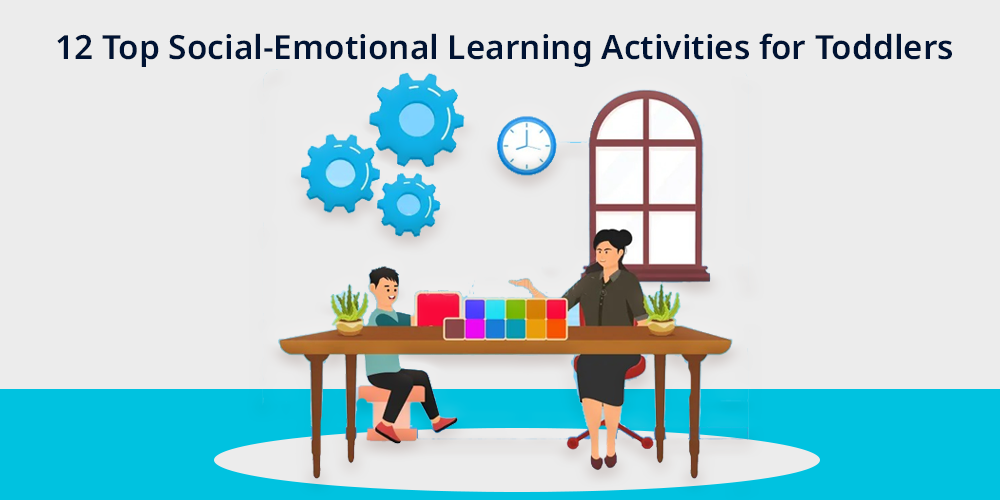
When children are in their toddler age, they learn to interact, express themselves, share their feelings and emotions. They start to explore the world around them and know their needs.
Most toddlers are children who belong to the age group of 1 to 4. At this stage, social emotional learning activities help toddlers to engage and interact with others.
It boosts the emotional intelligence , which is an important part of their life.
Through different activities and play, children learn to share and interact among each other. While making them play and learning , educators or teachers make sure that their learning is safe and fun.
With certain techniques, and methods, toddlers are taught these social and emotional skills, where they can express and teamwork.
Go through these top 12 social emotional learning activities for students that make them feel seen, heard and expressed.
With such techniques, teachers also foster safe and inclusive learning , where toddlers can learn and grow.
Contents
What are Social Emotional Learning Activities for Toddlers?
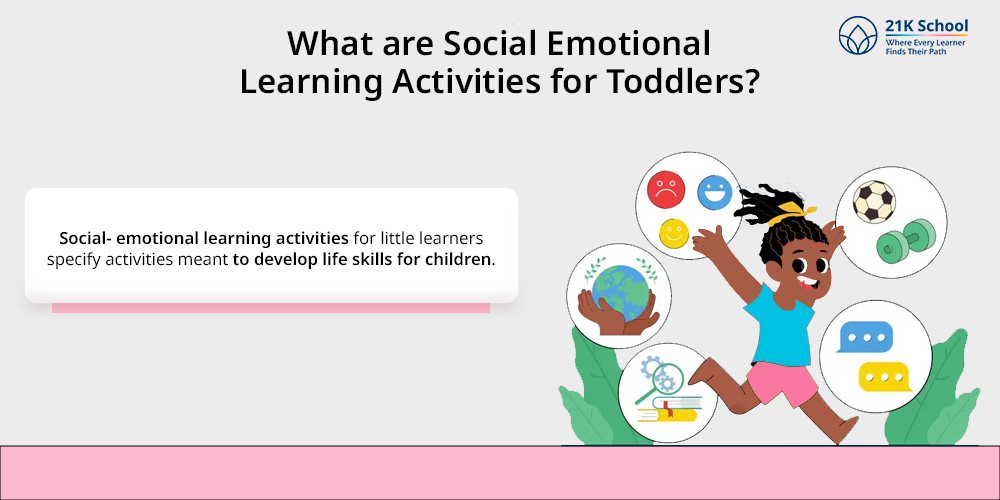
Social- emotional learning activities for little learners specify activities meant to develop life skills for children.
These activities equip children with skills that they need to learn. It helps in facing challenges, both socially and emotionally.
Social emotional learning activities for toddlers are designed to implement self- development skills like, managing emotions, self- awareness, social skills , etc.
12 Top Engaging Social- Emotional Learning Activities For Toddlers
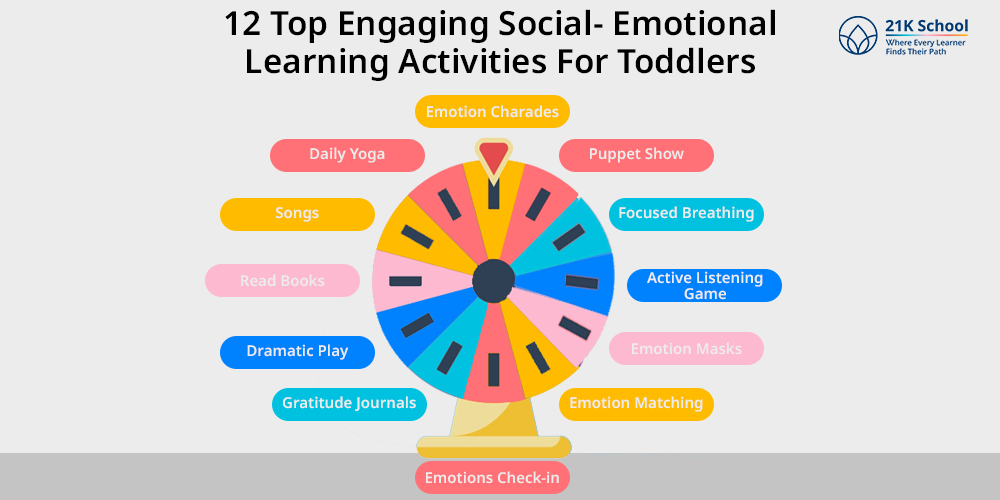
Engaging social-emotional learning intent to support development in toddlers. Through such activities, educators can engage toddlers in understanding emotions, social interactions, and communication processes.
1. Emotion Charades
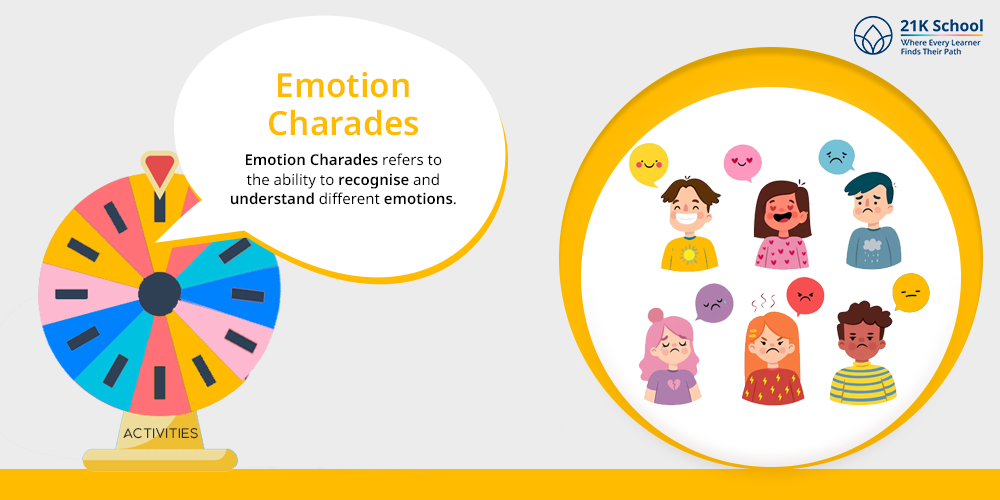
Emotion Charades refers to the ability to recognise and understand different emotions. It helps toddlers in emotional intelligence and social learning by playing games.
Playing methods:
- There are face emotions cards with different expressive faces as, happy, sad, excited, tired, scared, and angry emotions.
- Toddlers are asked to gather up. They choose a facial emotion card. After choosing a card, they have to act like the emotion on the card which is given to them. They can use their facial expressions or body language to showcase the facial emotions card.
- Other toddlers in a group have to guess the facial emotions that they are acting out.
- Once guessed out, the facial expressions acted, they have to explain it briefly to the group.
Implications:
It helps toddlers in self-expression, empathy , emotional management, and interaction process.
2. Puppet Show
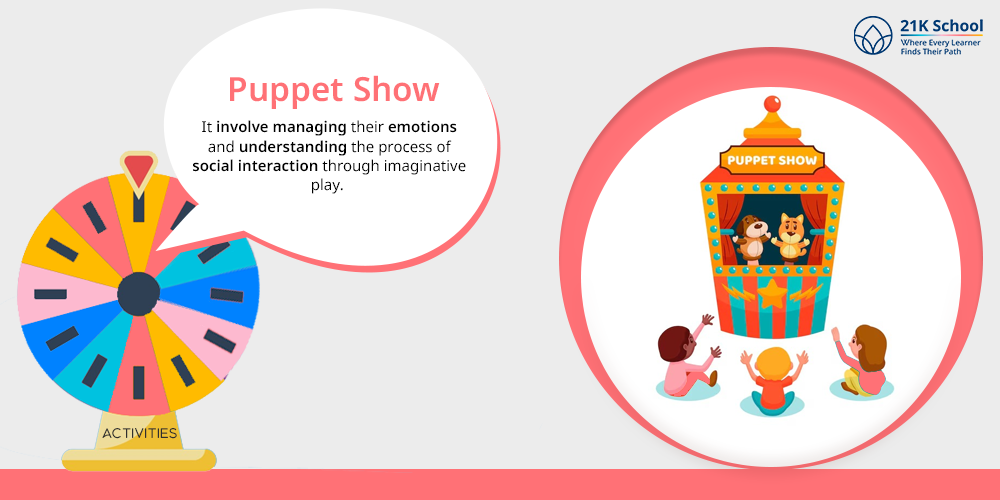
Puppet shows involve managing their emotions and understanding the process of social interaction through imaginative play.
Playing methods:
- In this puppet game, children have to use puppets and start communicating with the audience.
- Toddlers are asked to create stories and fill voices for them.
- They can put background voices, mimic or fill music and songs for puppet showcases.
Implications:
It enhances communication, problem- solving skills and empathy through playful and safe methods.
3. Focused Breathing
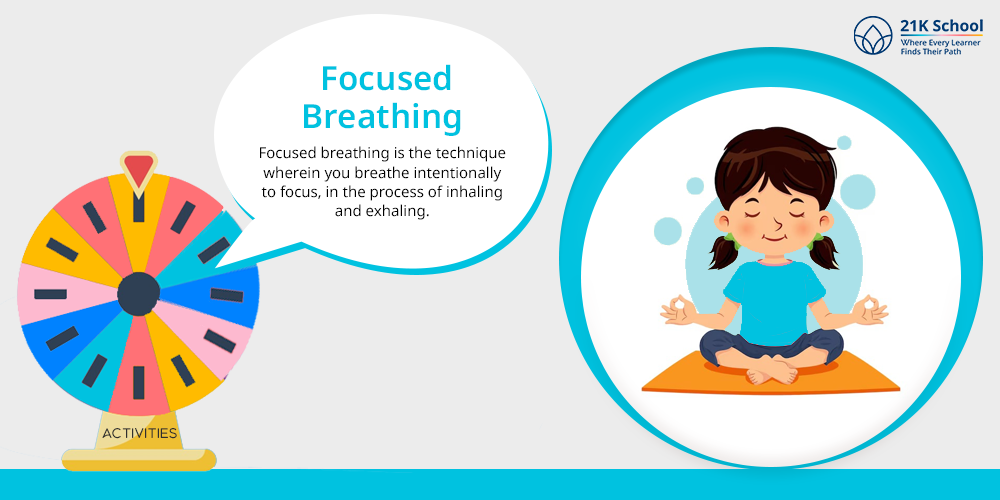
Focused breathing is the technique wherein you breathe intentionally to focus, in the process of inhaling and exhaling.
Playing methods:
- Toddlers get engaged in inhaling and exhaling movements and activities.
- With the help of balloons, they are asked to put one hand on their belly, and another hand on their chest.
- They are asked to exhale and see their belly movements.
Implications:
When dealing with strong emotions, this game promotes toddlers to remain calm when overwhelmed.
4. Active Listening Game
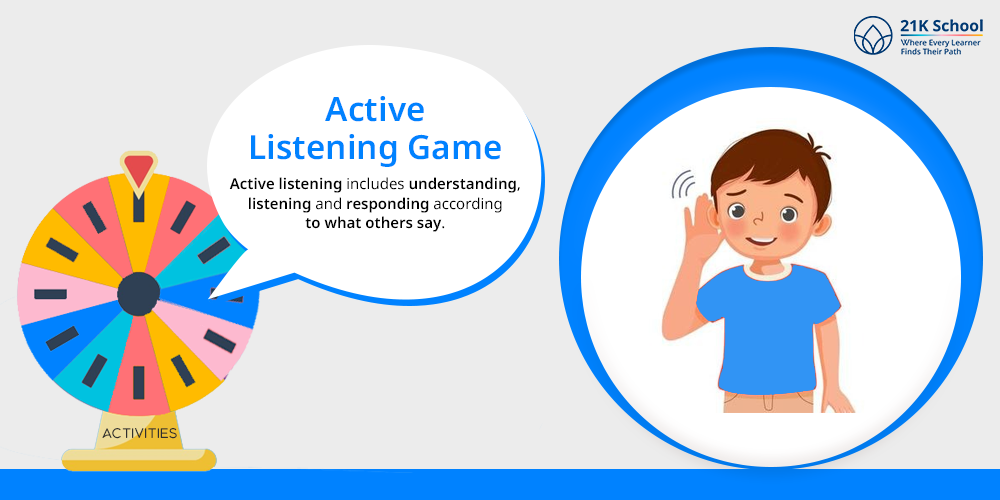
Active listening includes understanding, listening and responding according to what others say. Such games help to build listening and communication skills for toddlers.
Playing methods:
- Here, toddlers have to listen and follow instructions according to ‘Simon says’.
- Music plays, and toddlers have to dance and move their bodies with music flow. At the same time, they are supposed to freeze themselves as soon as music stops.
- This game helps children to listen actively and follow instructions.
Implications:
It increases listening skills and memory retaining information which is helpful in academic and social work.
5. Emotion Masks
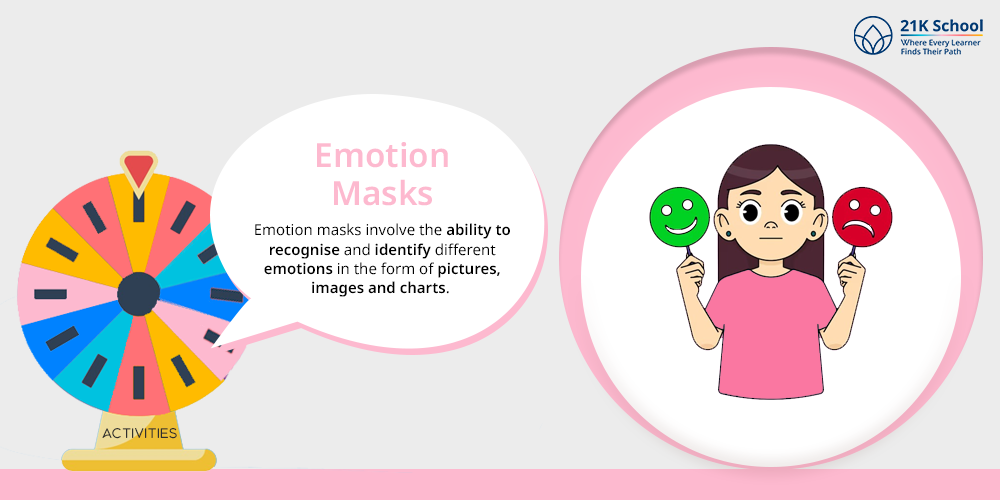
Emotion masks involve the ability to recognise and identify different emotions in the form of pictures, images and charts.
Playing methods:
- In emotion masks, toddlers have to make different emotions, with the help of things like, cardboard, paper, pictures, paper plates, etc.
- After making different emotions and expressions, they have to present it in front of an audience.
- Audiences have to guess and name them, which have been presented to them.
Implications:
It supports toddlers in emotional management and understanding their emotions.
6. Emotion Matching
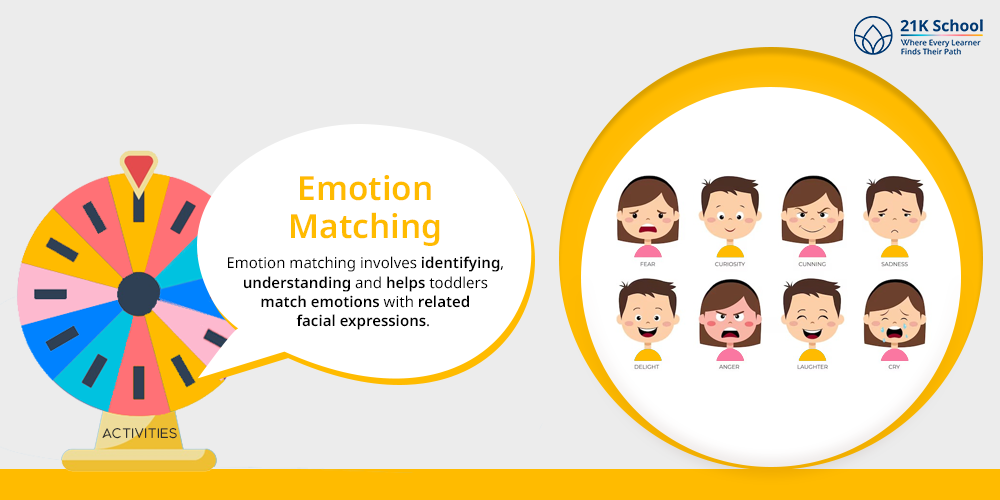
Emotion matching involves identifying, understanding and helps toddlers match emotions with related facial expressions.
Playing methods:
- Emotion matching games are arranged in the form of playing cards.
- Cards in different expressions are set up on the flat surface.
- Toddlers need to find an emotion- matching card pair from the scattered forms.
- They have to keep playing until they match emotion- card pair.
Implications:
It boosts emotional matching skills and develops empathy.
Read about: How to develop empathy in a child.
7. Emotions Check-in
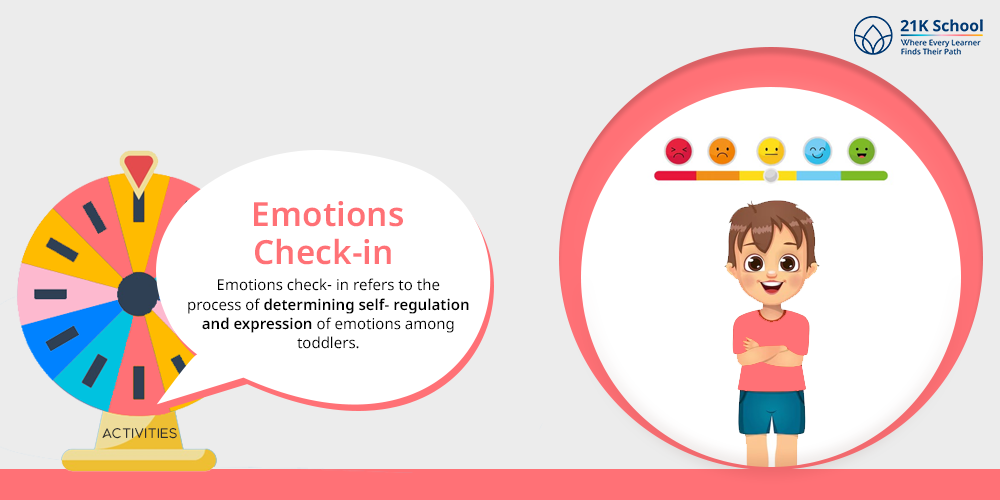
Emotions check- in refers to the process of determining self- regulation and expression of emotions among toddlers.
Playing methods:
- Toddlers are introduced to their favourite emotion or colour from their teachers or parents.
- Children have to match emotion, draw and colour it as per picture shown.
- After they finish drawing and colouring, they can show or discuss it with teachers, parents and peer groups.
Implications:
It encourages empathy, communication and daily emotion check- in for regulation.
8. Gratitude Journals
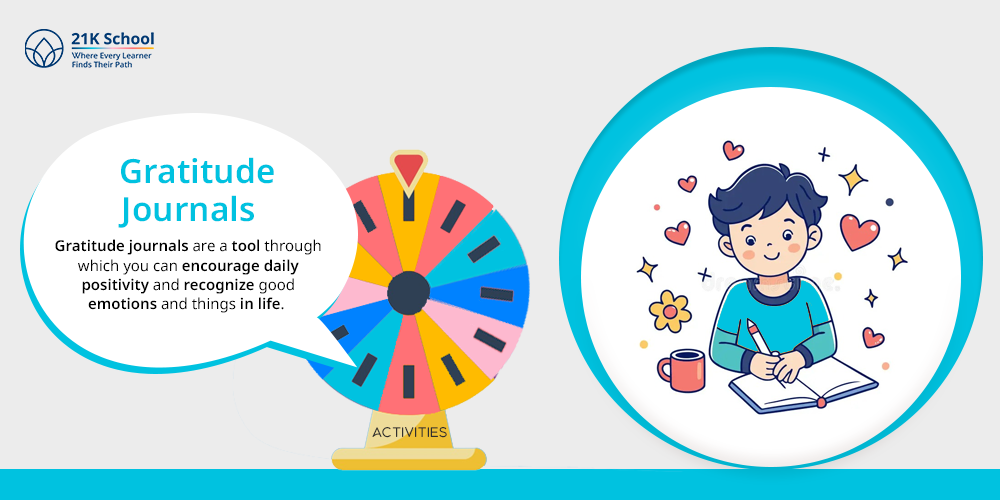
Gratitude journals are a tool through which you can encourage daily positivity and recognize good emotions and things in life.
Playing methods:
- Let’s talk about the gratitude journal game- ‘gratitude spies’. Here, each toddler is asked to share a stage and talk about one thing that they’re grateful for.
- Likewise, each of them is asked to share their gratitude form, meanwhile, gratitude spy guesses.
- Similarly, roles are rotated so that each one of them gets a chance to become a gratitude spy.
Implications:
It supports regulation of emotions, optimism and positive experience.
9. Dramatic Play
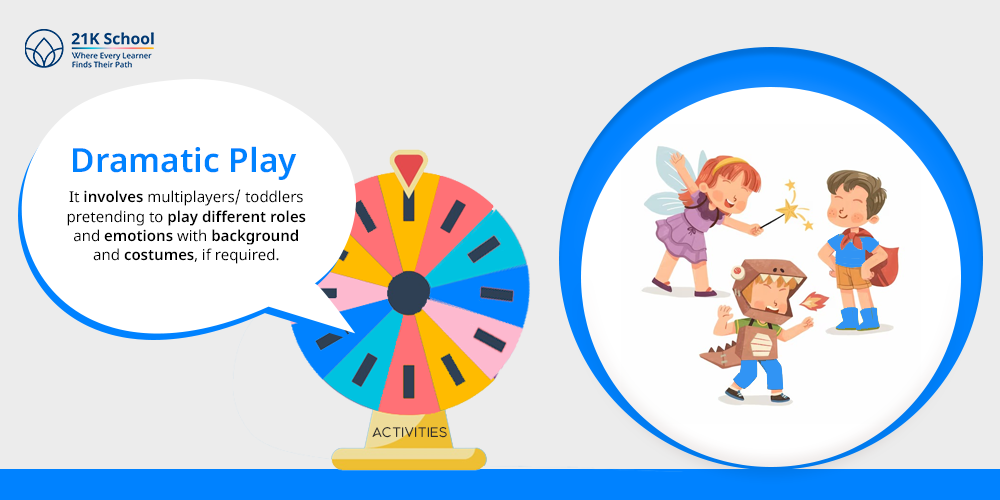
Dramatic play involves multiplayers/ toddlers pretending to play different roles and emotions with background and costumes, if required.
Playing methods:
- In dramatic play, toddlers can choose any role that they like to play and get arranged with their costumes and decorations.
- Then, they have to create scenarios and offer things/ items matching their play.
- You can also play songs and background music to stimulate their play in imaginative form.
Implications:
It enhances emotional management, imagination, and problem- solving skills .
10. Read Books
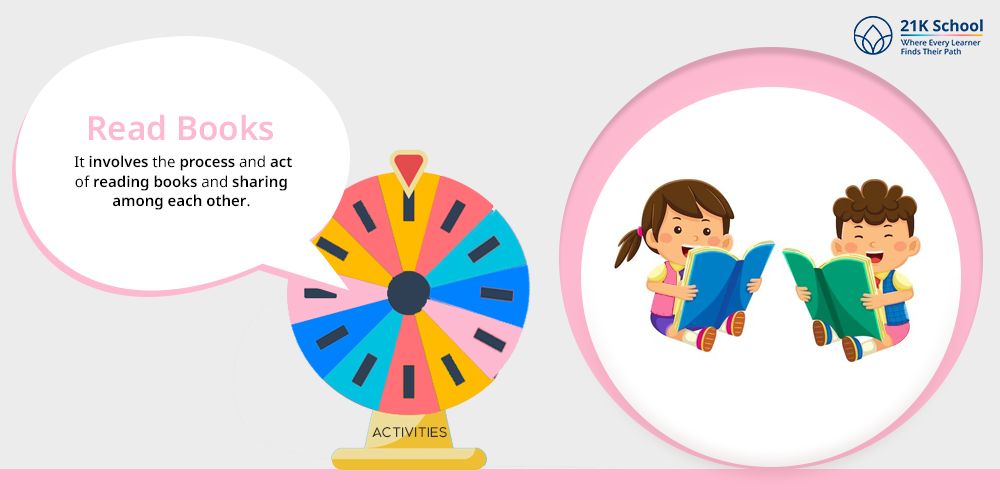
Reading books involves the process and act of reading books and sharing among each other. Through discussions among themselves, they can share different stories and opinions, with feelings of stories.
Playing methods:
- Toddlers are asked to choose a book and select their favourite character, picture or image.
- They can select books based on their favourite themes, such as rainbow, animals, comics, rhymes, etc.
- Alphabet or letter hunting games are done, selected from a given book, wherein toddlers are supposed to find them.
Implications:
It helps toddlers relate to real- life situations through stories and chapters. Explore more about the benefits of reading books
11. Songs
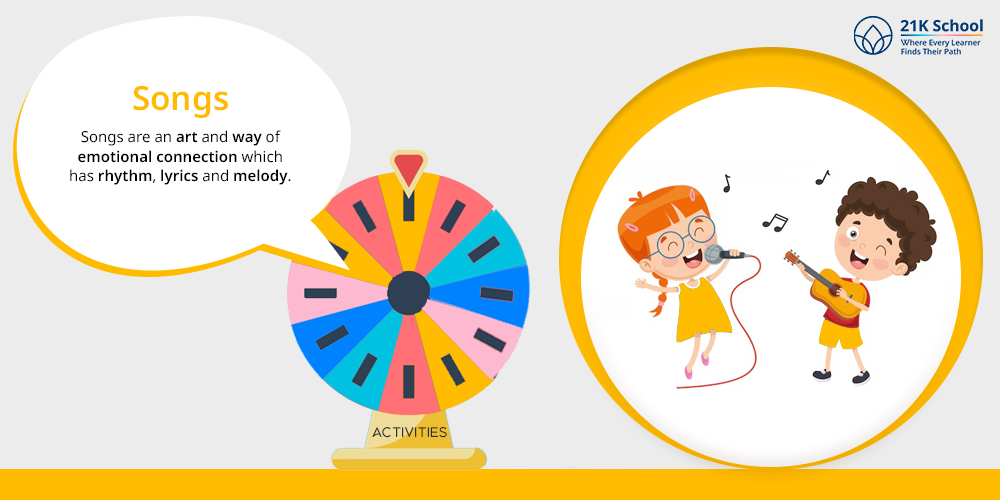
Songs are an art and way of emotional connection which has rhythm, lyrics and melody. It teaches emotional management, memory retention and expressing emotions.
Playing methods:
- In games like musical chairs, songs are played to engage toddlers in movements and activities.
- Here, a number of chairs are placed in a circle form, assuring chairs for each toddler.
- Songs or music are played, where toddlers run or walk around the chairs in circle form. Suddenly music stops, and toddlers are supposed to sit on these chairs.
- Whoever is left standing, goes out of the game. This game is repeated until one player is left. Last player is declared as the winner of the game.
Implications:
It makes social- emotional learning activities fun for toddlers through songs and music. Fun in learning helps toddlers to develop many other skills as well.
12. Daily Yoga
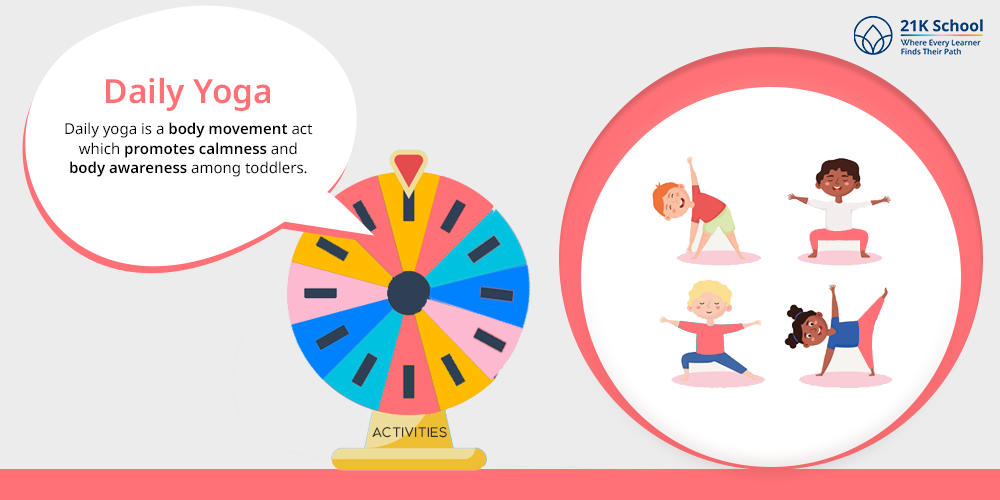
Daily yoga is a body movement act which promotes calmness and body awareness among toddlers. It reduces anxiety and stress, and boosts physical, mental and emotional stability.
Playing methods:
- In a circle form, yoga mats are kept with yoga cards on each mat for toddlers.
- When music starts playing, toddlers move around yoga mats.
- When music stops, they sit on yoga mats and perform yoga movements assigned to them.
Implications:
It encourages fitness, self-regulation and emotional balance.
Examples of Social- Emotional Learning Activities For Toddlers
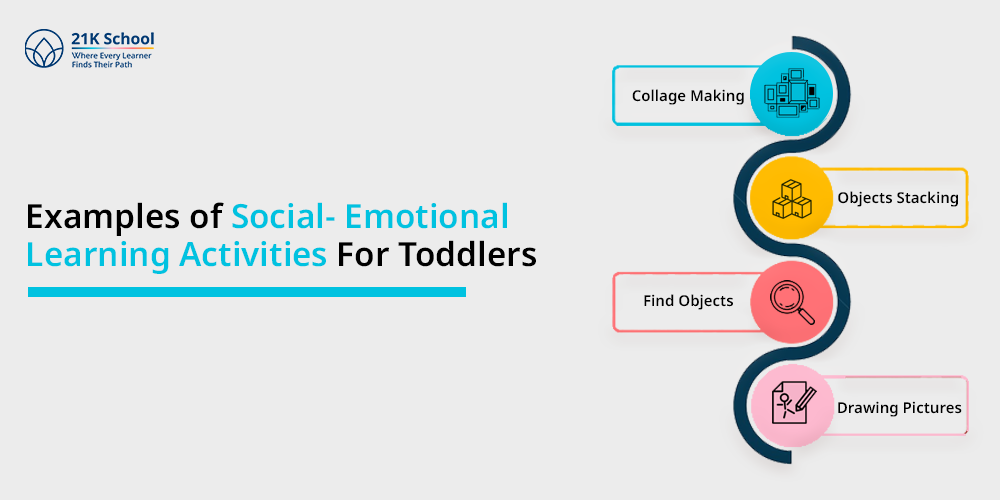
Here are a few social- emotional learning activities for toddlers that can be incorporated to develop important life skills .
- Collage Making: College making involves gathering of a toddler’s favorite emotions/ words and collecting it. They can use it in making collage for their activities.
- Objects Stacking: Object stacking includes building blocks and letting them fall down. It develops their fine motor skills and increases social- emotional learning through it.
- Find Objects: Find objects is to make children adaptable to emotion- related activities. These activities develop self- awareness , empathy and social awareness.
- Drawing Pictures: Drawing pictures showcases feelings and emotions of toddlers in the form of drawing and art works. It represents their expressions of different kinds.
Learn about creative drawing ideas for kids, for better enhancement of social- emotional learning for toddlers.
Final Thoughts
Top social- emotional learning activities for toddlers are not just for playing games, but learning with fun activities .
Through incorporation of such engaging social- emotional learning activities for toddlers.
Social- emotional learning activities teaches management of emotions, self- regulation, social interaction, and more. These activities help them in emotional intelligence and social interaction.
Social- emotional learning activities for toddlers are essential in their growth and development.
With the help of drama, songs, dance movements, toddlers learn emotional intelligence and other social activities.
